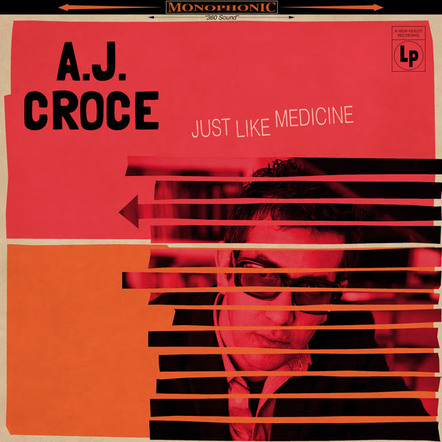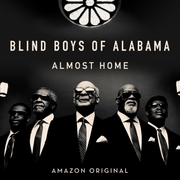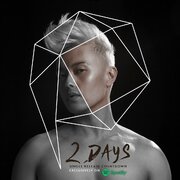New York, NY (Top40 Charts) Some artists are afforded the chance to tell their personal stories as they see fit, at a particular moment when they know the time has come. But for many, there is no choice - the story emerges hardwired to the music and they become forever identified with it no matter how their story may evolve or change.
A.J. Croce has been inextricably linked to a version of his own story by virtue of his name. He's experienced a lifetime of comparisons to a father he lost at age two, whose music bares little resemblance to his own output yet still serves as a reference point despite the years that have passed and the many iconic mentors who have stepped in to offer their counsel, creativity, and endorsement throughout his long career.
It's curious then that it now feels necessary to include the reference, as enough time has passed that a new generation of tastemakers and journalists might not know who Jim Croce was — that he was a golden-voiced everyman, a singer-songwriter-guitarist who died too soon, leaving one of pop music's most beautiful and memorable ballads (written about a young A.J.) in his wake.
Croce the younger, on the other hand, is a piano man, first and foremost, and a vocal stylist second. His muted growl pulls from a host of American traditions and anti-heroes — it's part New Orleans, part juke joint, part soul, but somehow evokes New York, a continuum where John Lurie meets Lou Reed. He is further a songwriter, driven by a personal muse, informed by a life on a boomerang of tragedy.
His gritty and accomplished ninth studio album, produced by legendary soul singer-songwriter and producer Dan Penn, is the latest and arguably greatest effort yet. Penn, of course, is writer of such hits as "The Dark End of the Street," "Cry Like a Baby," "I'm Your Puppet" and "Do Right Woman, Do Right Man," and producer of the Box Tops' "The Letter," as well as songs and recordings by Jerry Lee Lewis,
Bobby Blue Bland, Clarence Carter, and Alex Chilton. Also making appearances are Grammy Award-winning country artist Vince Gill, Steve Cropper (Booker T. & the MGs, Blues Brothers, author of many Stax hits), the McCrary Sisters and the Muscle Shoals Horns.
Croce has lived longer now than his father did — at 45, he is 15 years beyond the age his father was when he died. With Just Like Medicine (due out August 11, 2017 on Compass Records) an authentic version of his story, which contains both unimaginable sorrow and many blessings, can be felt and understood.
Raced across a thousand miles / Met my match and started fires
Lost myself in all the wreckage / Then I finally got the message
Someone had to show me the way
Sure as she's heaven sent / Cures just like medicine
These lyrics from the title track reveal the album's painful origins as well as its redemptive power. Just Like Medicine is an exploration of relationships, the disappointments and the confusion, and reflects Croce's realization about the role music has played in his life. "I've been to therapy for 25 years and it never helped me as much as sitting down and playing the piano or writing a song."
As he explains, "I wanted to make a real soul album, but not a throwback Stax album or a Motown album or anything like that — even though Dan was producing and there are great players from that world and Muscle Shoals on these tracks." Sonically and in every other way, the intention on Just Like Medicine seems to keep things real. "We recorded this album in mono, to analog tape, primarily to two tracks and we never used more than sixteen tracks," says Croce. "We did that not to be cool or trendy, but because these days everyone seems to be listening to music primarily on little devices and tiny speakers. In a world of amazing audio possibilities, we're all basically listening to music on transistor radios again. After that first session, Dan explained that when he worked with the Box Tops, they only had like three tracks — one for the band, one for the vocals, one for string and horns. So that became our starting point."
As one listen to Just Like Medicine confirms, that turned out to be an excellent place to start, including opening track "Gotta Get Outta My Head," which has what Croce calls with a laugh "its own dark voodoo" and explores its own dark truth. "I wrote that song in my kitchen hitting a box and thinking how I had to find a way to get out of my own head," he says. "So, as a recording and a thought, I absolutely love that song because it's so true."
Just Like Medicine's second track, "The
Heart That Makes Me Whole," was written by Croce with the late great Leon Russell. Croce notes, "We'd played together over the years, and one time I went to go see Leon play with Willie
Nelson and we really connected through the music that we both loved — whether it was Ivory Joe Hunter, or all these great piano players who we both loved. At first, it felt a little sad recording this song because Leon and I had spoken and I was looking forward to have him on this album. Leon lived 20 minutes away from me in Tennessee, so it was bittersweet because we couldn't record it together. But I was happy that Steve Cropper, the McCrary Sisters and the Muscle Shoals Horns and I could try to fill that void as best we could."
Indeed Croce feels fortunate to be in such excellent musical company throughout Just Like Medicine. "I feel so lucky to have these players with me on this album," he says. "Everyone on this record brought so much to it. We were supposed to finish the album last fall, and then Dave Hood broke his wrist on tour in Europe. I thought about getting another bass player, but then I listened to some of the roughs and realized I didn't want anyone else. The way we were recording this album, there was no going back to fix anything, we needed these players making these sounds."
The track "The Name of the Game," is notable for many reasons. One is that it finds Croce connecting with a part of his soulful legacy that hits close to home because the bluesy gem is a previously unreleased song by his father — the only known completed song written for the elder Croce's next album, and the last song that he wrote. A.J. explains, "'The Name of the Game' is a song I had known about for a really long time. It was destined for my dad's next record that he never got to make. The song had been bootlegged, just him playing guitar, but it had never been properly recorded. I thought this song really fit this album. We listened to a couple of my father's demos and final recordings and tried to treat the song with the respect it deserves — while still making it my own. At the beginning of our track, Colin Linden — who's amazing — is playing the same guitar my father wrote the song on. You can tell it's a Jim Croce song, no doubt. And I just love Vince Gill's playing, so I called him up to add his musical touch to it too."
In truth — as Just Like Medicine demonstrates beautifully — A.J. Croce has spent his very musical life forging deep connections with music and musicians, including with producer Dan Penn and many of the other soulful artists who helped him make this new album. "I've had the chance to work with a lot of my musical heroes and a lot of people who became my heroes as I worked with them," Croce explains. "These people don't have a lot to prove. And one thing I found out is that even with all they've done and all they've achieved, every one of them is really open in the end. Even though they may have a certain style, and sometimes be stubborn about how they do things, when push comes to shove, they are open, willing and able to go in any number of directions to chase a good song. They've all taught me a lot about how to follow the music and find the truth. That's why the music of Just Like Medicine sounds real and raw — it's meant-to-be music. This music here was not fixed. This music here was made."
About A.J. Croce
A.J. Croce's eight albums have been released via both major and independent labels, and have charted 17 Top 20 singles and all nine albums on the radio including on Top 40, Americana, Independent, Blues, and Jazz. A virtuoso piano player, he performed at a TED Talk and gave a master class at the University of Barcelona. Over his 20-year career he has shared the stage with an innumerable list of eclectic artists, from
Lyle Lovett to Ray Charles, Béla Fleck to
James Brown,
Lenny Kravitz to Morphine, and
Rod Stewart to Dave Matthews. He's also sat in with many notable performers, including Willie Nelson, Ben Harper, Ry Cooder, the Neville Brothers, and
Waylon Jennings. A.J. has done co-writes with acclaimed songwriters including Leon Russell, Gary Nicholson, and Robert Earl Keen and worked with legendary producers such as T-Bone Burnett, Jim Keltner, and Allen Toussaint. He has been seen and heard on shows including Late Show With
David Letterman, The
Tonight Show With Jay Leno, Good Morning America, Austin City Limits, and on MTV, CNN, and E! His music has been featured on television, in films, and commercials including for Coca Cola, Heineken, Levi's, and Toyota. Croce's last release, Twelve Tales, was recorded across the U.S. over one year with six legendary producers: the late "
Cowboy" Jack Clement (Johnny Cash, Elvis Presley), Allen Toussaint (Dr. John, Eric Clapton), Mitchell Froom (Los Lobos, Crowded House), Tony Berg (Fiona Apple, Bob Dylan), Greg Cohen (Tom Waits, John Zorn), and
Kevin Killen (Elvis Costello,
Peter Gabriel); A.J. co-wrote the disc's "Rollin' On" with Russell. Toussaint said of Croce: "In such a crowded music universe it is a pleasure to witness triple uniqueness: pianist, songwriter, singer and at such a level. And who does he sound like? ... The answer is: himself … A.J. Croce." According to Willie Nelson, "A.J. Croce has wisdom beyond his years. With his music, he represents his generation with a profound sense of honesty in his lyrics and quality in his delivery. The future of entertainment is safe in his hands!"
























